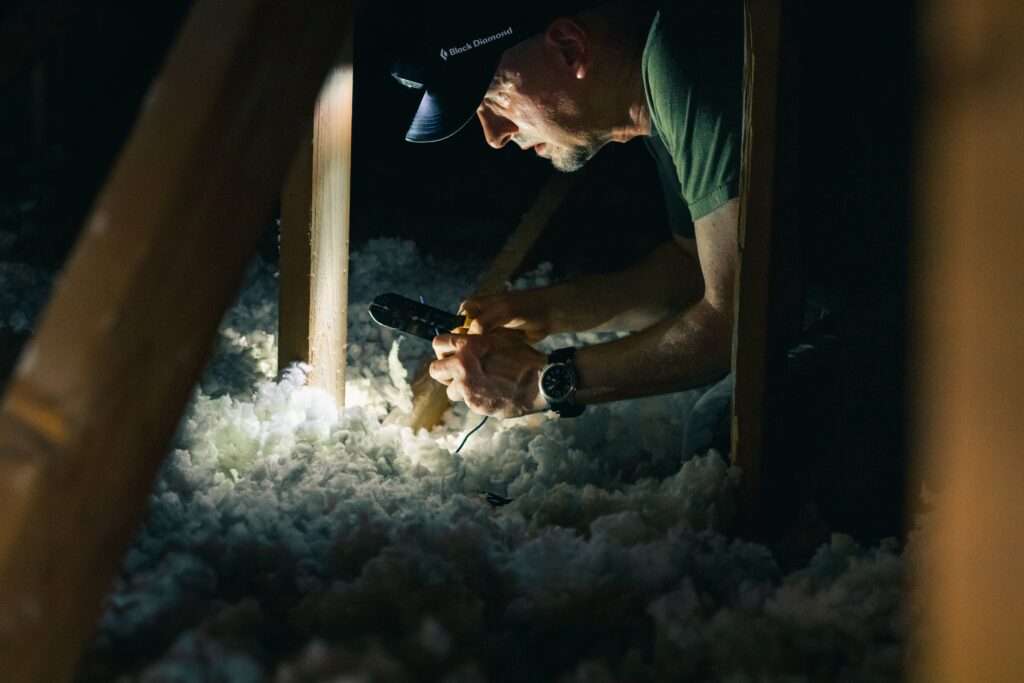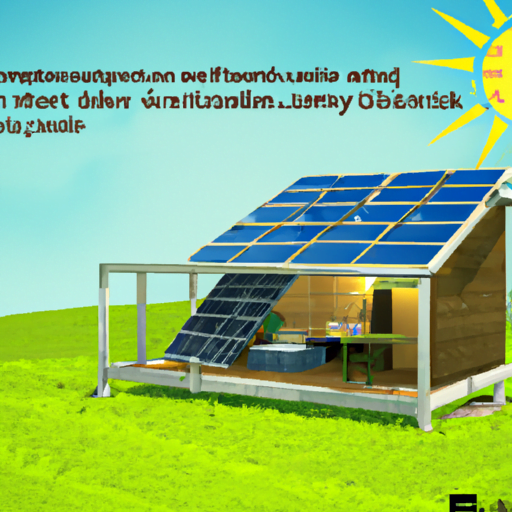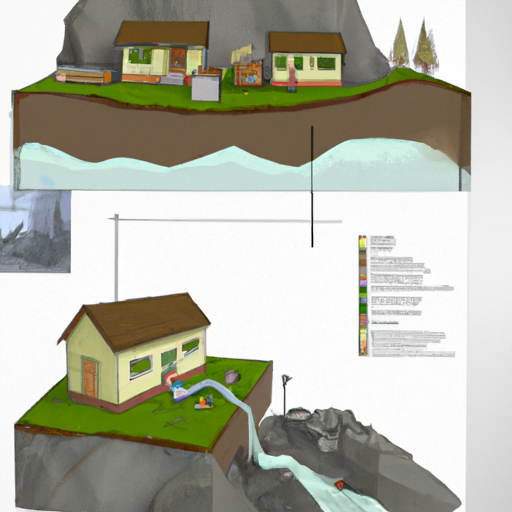Living off the grid has become an increasingly popular lifestyle choice, as people seek independence and sustainability. In this article, we will explore the world of DIY off-grid living and share ingenious hacks that can make this lifestyle more attainable and enjoyable. From generating your own power to maximizing storage space and creating a self-sustaining garden, these hacks will empower you to embrace a sustainable and self-sufficient lifestyle, even in the most remote locations. Get ready to discover practical tips and tricks that will revolutionize the way you live off the grid.

Water Supply
Water is a crucial resource for off-grid living, and ensuring a sustainable water supply is essential. Here are some ingenious hacks to collect and purify water, as well as create a solar water heater.
Collecting Rainwater
Collecting rainwater is a practical and sustainable method to meet your water needs. One effective way to collect rainwater is by installing a rain barrel or multiple barrels connected to your roof’s downspouts. This allows rainwater to be channeled into a storage container, ready for use whenever needed. Make sure to cover the barrels to prevent debris and insects from entering the system.
Another method of collecting rainwater is by creating a rain garden. By strategically planning the landscape and using specific plants, you can create a beautiful garden that collects and absorbs rainwater. The plants help filter the water and allow it to replenish the groundwater, reducing the strain on other water sources.
Purifying Water
Although collected rainwater can be used for non-potable purposes, such as watering plants or cleaning, it is vital to have a reliable system for purifying water for drinking and cooking. One method is through a gravity-fed water filter system. This setup utilizes multiple filtration stages, including charcoal, ceramic, and activated carbon filters, to remove impurities and ensure safe drinking water.
Another ingenious hack for water purification is the use of a solar still. This method harnesses solar energy to evaporate water, leaving behind contaminants, and then condenses the steam to collect purified water. You can easily build a simple solar still using common materials like glass, plastic sheeting, and a collection container.
Creating a Solar Water Heater
Heating water can consume a significant amount of energy, but by creating a solar water heater, you can tap into the power of the sun to meet this need. One simple method involves building a solar water heating system using black piping and a reflective surface. The black piping absorbs the heat from the sun, while the reflective surface redirects any lost heat back onto the pipes, maximizing the effectiveness of the system. This heated water can then be stored in a tank for various uses, such as showering or dishwashing.
Food Production
Growing your own food is not only rewarding but also essential for off-grid living. Here are some ingenious hacks to help you become self-sufficient in food production.
Building a Greenhouse
A greenhouse enables you to extend your growing season and grow a wider range of crops. You can build a greenhouse using affordable materials such as PVC pipes or reclaimed wood for the frame and polyethylene sheets or recycled windows for the walls. Incorporating ventilation, insulation, and shading can help maintain optimal growing conditions throughout the year.
Creating a Vegetable Garden
Having a vegetable garden provides a direct and sustainable source of fresh produce. Start by selecting a suitable site with adequate sunlight and good soil drainage. Raised beds are an excellent option for off-grid gardening, as they allow better control over soil quality and prevent soil erosion. Utilize organic gardening practices, such as composting and mulching, to nourish the soil and reduce reliance on external fertilizers.
Raising Chickens for Eggs and Meat
Keeping chickens is a valuable addition to any off-grid homestead. Chickens not only provide a consistent supply of eggs but can also be a source of meat. Building a chicken coop with ample roosting space, nesting boxes, and protection from predators is essential. Additionally, ensure their diet is well-balanced with grains, greens, and insects to promote healthy egg production and meat growth.
Energy Generation
Generating your own electricity is a key aspect of off-grid living. Consider these ingenious hacks to harness renewable energy sources and reduce reliance on the grid.
Installing Solar Panels
Solar panels are a popular choice for off-grid energy generation. By installing solar panels on your property, you can harness the power of the sun and convert it into electricity. Opt for high-efficiency solar panels and position them at an angle that maximizes sunlight exposure. Using a charge controller and battery bank, you can store excess energy to power your home during nighttime or cloudy days.
Building a Wind Turbine
In areas with consistent wind patterns, a wind turbine can be an excellent supplement to your energy needs. Building a DIY wind turbine requires careful planning and consideration of local regulations. Select a suitable site with sufficient wind speeds, and use quality materials to construct the turbine blades, tower, and generator. Incorporate an efficient battery storage system to ensure continuous power supply even during periods of low wind.
Utilizing Hydroelectric Power
For properties near a flowing water source such as a stream or creek, hydroelectric power can be an efficient and constant source of energy. Constructing a small-scale hydroelectric system involves diverting a portion of the water flow through a turbine, which generates electricity. This method requires careful engineering and permits, as it involves the alteration of natural water flows. Consult with experts to ensure compliance with regulations and effective implementation.
Waste Management
Proper waste management is crucial for maintaining a sustainable and healthy off-grid lifestyle. Consider these ingenious hacks for managing waste effectively.
Composting Toilets
Composting toilets are a sustainable alternative to traditional water flush toilets, as they convert human waste into nutrient-rich compost. There are various composting toilet designs available, including self-contained systems and systems that separate urine from solid waste. Regular maintenance, such as adding carbon-rich materials and monitoring moisture levels, promotes effective decomposition.
Constructing a Greywater System
Greywater, which is wastewater from sources such as sinks, showers, and laundry, can be reused for irrigation purposes. Constructing a greywater system involves collecting and filtering the water before directing it to your garden or landscape. Simple methods include using a mulch basin or gravel filter to remove impurities, ensuring the greywater is safe for plants. It is essential to use biodegradable and eco-friendly cleaning products to protect both the plants and the environment.
Recycling and Repurposing
Off-grid living encourages a focus on reusing and repurposing materials to minimize waste. Establish a comprehensive recycling system for materials such as glass, plastic, and metal. Additionally, get creative with repurposing items that may otherwise be discarded. For example, old shipping pallets can be transformed into garden beds, and glass jars can become storage containers. Embrace the mindset of reducing, reusing, and recycling to create a more sustainable off-grid lifestyle.

Heating and Cooling
Maintaining a comfortable temperature within your off-grid home can be achieved through these ingenious heating and cooling hacks.
Building a Rocket Stove
Rocket stoves are efficient wood-burning stoves that provide excellent heating while minimizing fuel consumption. By optimizing the combustion process, rocket stoves generate intense heat from a small amount of wood. Constructing a rocket stove involves using fire-resistant materials such as bricks or metal to create a chamber for the combustion process. The design concentrates the heat, ensuring maximum efficiency and minimal smoke production.
Creating an Insulated Home
Proper insulation is essential for reducing heat loss during cold winters and heat gain during hot summers. Insulate your off-grid home using eco-friendly and sustainable materials such as natural fibers or reused insulation. Pay particular attention to windows, doors, and the roof to prevent drafts and temperature fluctuations. By creating an airtight and well-insulated home, you can significantly reduce your energy consumption for heating and cooling.
Utilizing Thermal Mass
Thermal mass refers to materials that can store and release heat over an extended period. Utilizing thermal mass in your off-grid home can help regulate indoor temperatures. Materials such as stone or concrete effectively absorb excess heat during the day and release it during cooler periods. Include features like a stone wall or flooring to increase thermal mass within your home, providing a more comfortable living environment.
Off-Grid Communication
Staying connected with the outside world is vital even in an off-grid setting. These ingenious hacks will help you establish reliable communication methods.
Setting up Two-Way Radios
Two-way radios, also known as walkie-talkies, are a practical option for off-grid communication, especially in areas with limited cell phone reception. They operate on specific radio frequencies and do not require cellular networks to function. Ensure you research the range and capabilities of different two-way radios and select a model suitable for your communication needs.
Establishing a Mesh Network
A mesh network allows devices within a defined area to communicate with each other without relying on a centralized hub. This decentralized communication system is especially useful in off-grid settings where traditional internet access may be limited. By connecting devices such as smartphones, laptops, and tablets in a mesh network, you can share information and stay connected within your off-grid community.
Utilizing Satellite Internet
For more reliable and extensive communications, consider utilizing satellite internet. Satellite internet enables you to access the internet anywhere, regardless of terrestrial infrastructure. With a satellite dish installed on your property, you can receive and transmit data via satellites orbiting the Earth. While satellite internet may have limitations in terms of speed and data restrictions, it provides a valuable means of staying connected in remote off-grid locations.

Off-Grid Entertainment
Living off-grid does not mean giving up modern entertainment. Explore these ingenious hacks to enjoy entertainment while minimizing energy consumption.
Building a DIY Movie Projector
Creating a DIY movie projector allows you to enjoy movies and TV shows without relying on traditional power sources. By repurposing a smartphone or tablet as the video source and using a simple magnifying lens or a basic projector kit, you can project images onto a makeshift screen or a white wall. This setup is ideal for enjoying outdoor movie nights without the need for excessive electricity.
Creating a Portable Off-Grid Music System
Music is an essential part of entertainment, and with a portable off-grid music system, you can enjoy your favorite tunes wherever you go. Build a DIY solar-powered speaker using a solar panel, rechargeable batteries, and a portable amplifier. Charge the batteries using solar energy during the day and connect your music player or smartphone to the amplifier for hours of music playback.
Setting up Gaming Systems with Sustainable Power
If you’re a fan of gaming, consider setting up gaming systems powered by sustainable energy sources. Invest in energy-efficient gaming consoles or gaming PCs to minimize power consumption. Combine this with a renewable energy setup, such as solar panels or wind turbines, and store excess energy in a battery bank for uninterrupted gaming sessions. Enjoy your favorite games while minimizing your off-grid energy footprint.
Home Security
Maintaining home security is essential, no matter where you live. Explore these ingenious hacks for enhancing security in an off-grid setting.
Installing Solar-Powered Security Cameras
Solar-powered security cameras provide reliable surveillance while minimizing energy consumption. These cameras use built-in solar panels to charge the batteries, ensuring continuous operation without the need for a wired power source. Install the cameras strategically around your property to monitor entrances, perimeters, and other vulnerable areas, providing peace of mind in your off-grid home.
Building Fence and Barriers
Physical barriers play a vital role in enhancing home security. Build sturdy fences using materials like wood or metal to establish clear boundaries and deter unwanted intruders. Consider installing gates with secure locks and reinforcements for extra protection. Additionally, utilize natural barriers such as hedges or thorny plants as an added layer of security around your property.
Setting up Motion Sensor Alarms
Motion sensor alarms are a cost-effective way to detect any unauthorized movement around your off-grid home. These alarms utilize sensors that trigger an audible alarm or notification whenever motion is detected within their range. Install motion sensor alarms near entrances, windows, and other vulnerable areas to deter potential intruders. Pair these alarms with solar-powered lighting to further enhance security during the night.

Alternative Transportation
Reducing reliance on traditional vehicles is not only environmentally friendly but also promotes self-sufficiency in off-grid living. Consider these ingenious hacks for alternative transportation.
Building a DIY Electric Bike
Electric bikes are an excellent alternative to gasoline-powered vehicles, offering a more sustainable and efficient mode of transportation. Building a DIY electric bike involves converting a regular bicycle with an electric motor and battery system. Kits are available for various bicycle types and skill levels, enabling you to assemble your own electric bike and enjoy emission-free travel.
Creating a Solar-Powered Charging Station
To charge your electric modes of transportation, such as electric bikes or electric cars, consider building a solar-powered charging station. Install solar panels on a shaded area of your property and connect them to a charge controller and battery bank. Use this stored solar energy to charge your vehicles, ensuring a sustainable and renewable source of power.
Utilizing Biofuels
Biofuels provide another sustainable alternative for transportation in off-grid settings. Consider using biofuels such as biodiesel or ethanol, which can be produced from renewable resources like plant oils or fermented crops. With the appropriate setup and equipment, you can produce your own biofuels, reducing reliance on fossil fuels and promoting a more self-sufficient off-grid lifestyle.
Providing Sanitation
Maintaining proper sanitation and hygiene is crucial for a healthy and comfortable off-grid living. Explore these ingenious hacks to create sanitation facilities.
Constructing a DIY Outdoor Shower
Building a DIY outdoor shower allows for refreshing and hygienic bathing while minimizing water consumption. Utilizing collected rainwater and a gravity-fed system, you can create a simple shower setup that provides the necessary water pressure for effective cleansing. Incorporate a drainage system to direct the used water away from your living area and towards a suitable location, such as a greywater system or a designated absorption area.
Building a DIY Waterless Composting Toilet
Waterless composting toilets offer a sustainable and odorless solution for waste disposal. These toilets utilize a combination of organic materials, such as sawdust or peat moss, to aid in decomposition and eliminate odor. Constructing a DIY waterless composting toilet involves building a suitable enclosure with a collection container for waste and a separate chamber for composting. Regularly maintain the compost pile and ensure proper ventilation for effective decomposition.
Creating a Simple Handwashing Station
Maintaining proper hand hygiene is essential for a healthy off-grid lifestyle. Creating a simple handwashing station involves setting up a basin with a foot-operated pump or a tap connected to a water source. Position the station conveniently near commonly used areas such as the kitchen or bathroom. Use biodegradable soap and place a container beneath the station to collect and reuse the water for tasks like watering plants or cleaning.
Living off the grid requires resourcefulness and creative solutions to meet basic needs. By utilizing these ingenious hacks for water supply, food production, energy generation, waste management, heating and cooling, communication, entertainment, home security, transportation, and sanitation, you can embrace a self-sufficient and sustainable off-grid lifestyle. Incorporate these innovations into your off-grid living journey and witness the endless possibilities of a truly independent way of life.





